Text
Table of Contents
The Who's Who: Cast of Characters [x]
Meet the Creative Team [x]
In The Heights: A Movie Musical [x]
Viewing Guide Questions [x]
Abuela Claudia: The Heart of the Community [x]
Nina: A Journey of Self-Discovery [x]
Dreaming of What $96,000 Could Do... [x]
No Me Diga: The Gentrification of Washington Heights [x]
Sonny & The Impossible Sueñito [x]
Usnavi: The Art of Storytelling [x]
0 notes
Text
The Who's Who: Cast of Characters
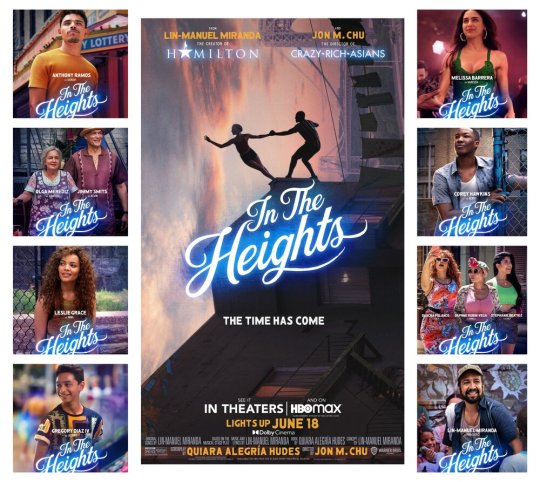
Usnavi (Anthony Ramos) → moved to New York City with his parents at the age of 8; has lived with Abuela Claudia since the death of his parents; runs a bodega in Washington Heights, but dreams of moving back to the Dominican Republic to restore his late father’s bar; has a huge crush on Vanessa
Abuela Claudia (Olga Merediz) → never had children of her own, but becomes the matriarch of the entire block
Kevin Rosario (Jimmy Smits) → owner of the local cab company, Rosario’s Car Service; everything he does is for the benefit of his daughter, Nina – even if it means selling his business
Nina Rosario (Leslie Grace) → the first of the Rosario family to attend college; feels overwhelming pressure from her family and the community to succeed; her experiences at Stanford leave her questioning whether she wants to continue her education there at all; like a sister to Usnavi
Benny (Corey Hawkins) → runs dispatch at Rosario’s Car Service; broke up with Nina before she left for Stanford because he didn’t want to stand in the way of her success; heads back to work in the middle of the blackout after seeing the way the community is struggling
Vanessa (Melissa Barrera) → works at Daniela’s salon, but dreams of leaving Washington Heights to become a successful fashion designer; despite saving up money to move to a new apartment downtown, she is unable to do so without a cosigner; doesn't make her feelings for Usnavi clear until the day before he's set to leave
Sonny (Gregory Diaz IV) → works at the bodega with his cousin, Usnavi; his undocumented status crushes his dream of attending college one day
Daniela (Daphne Rubin-Vega) → owner of a Washington Heights salon that has been priced out of the neighborhood
Carla and Cuca (Stephanie Beatriz and Dascha Polanco)→ work at Daniela’s salon; always know the local gossip and share it with their clients
Alejandro (Mateo Gómez) → a lawyer who helps Usnavi buy back his father’s bar in the Dominican Republic, as well as begin the application process for Sonny to become a US citizen
Graffiti Pete (Noah Catala) → instrumental in breaking Vanessa’s creative rut and in inspiring Usnavi to stay in Washington Heights
Piraguero (Lin-Manuel Miranda) → sells piragua in Washington Heights, but finds himself in competition with a Mr. Softee vendor
Image source: [x]
7 notes
·
View notes
Text
Meet the Creative Team
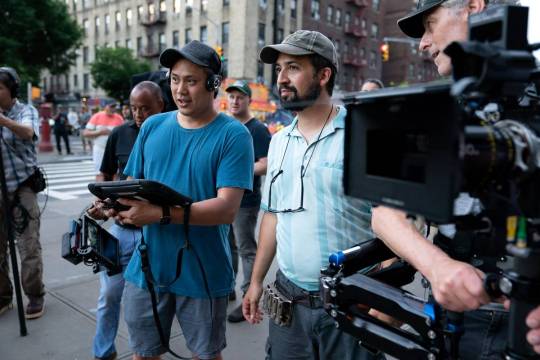
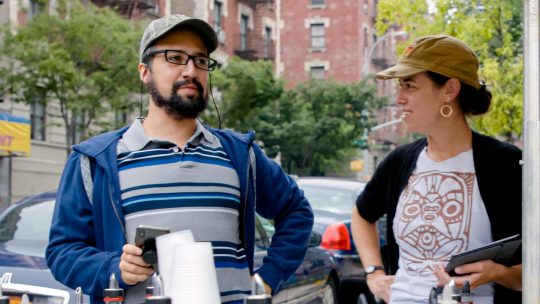
Directed by Jon M. Chu
Screenplay by Quiara Alegría Hudes
Based on the Musical Stage Play In The Heights:
Music and Lyrics by Lin-Manuel Miranda
Book by Quiara Alegría Hudes
Concept by Lin-Manuel Miranda
Film Release Date: June 10, 2021
Image sources: [x], [x]
0 notes
Text
In The Heights: A Movie Musical

*SPOILERS AHEAD FOR THE 2021 FILM IN THE HEIGHTS*
Synopsis
Lin-Manuel Miranda and Quiara Alegría Hudes’ hit musical In The Heights takes to the big screen in this John Chu-directed adaptation. The film opens with the words “¿Qué quiere decir sueñito?” written across a black screen as the voice of a child asks “What does sueñito mean?” Another voice, which we later learn is Usnavi, answers: “¿Sueñito? It means ‘little dream’.” The scene changes to the sight and sound of waves crashing against the shore, before showing Usnavi surrounded by children at his beachside bar. “That’s it? No story?” one of the boys questions him (In The Heights 0:27-0:48). Usnavi concedes and all of the children take a seat to listen to his story about “a far away land called Nueva York” (In The Heights 1:11-1:13).
Recounting his days running a bodega in Washington Heights with his cousin, Sonny, he slowly introduces the other central characters of the story. Abuela Claudia, who never had any children of her own, has become the matriarch of the entire block and religiously buys lottery tickets from the bodega. Kevin Rosario, owner of the successful cab company “Rosario’s Car Service”, Usnavi’s old friend Benny, who works dispatch for the cab company, and the salon ladies, Daniela, Carla, and Cuca, all come in daily for coffee and lottery tickets. Another regular customer is Vanessa, Usnavi's crush, whom he often gives free coffee to. Meanwhile, Nina Rosario, Kevin’s daughter, has just arrived home from her first year at Stanford.
Although Usnavi loves the bodega, he dreams of returning to the Dominican Republic to restore the bar that his father used to own. After purchasing the bar, he makes plans to leave New York. Vanessa, too, dreams of leaving Washington Heights to become a fashion designer. Her hope of renting an apartment downtown is dashed when the real estate agent says she will need someone to cosign the lease. Nina, on the other hand, wants to come back home. The lack of community and the racism she faced at school lead to her decision to drop out of school, despite Usnavi’s assertion that she was the top student during their school days together. The salon ladies, meanwhile, are being forced out of the community due to the rising cost of rent on their salon space. When Usnavi finds out that a winning lottery ticket was purchased at his bodega, everyone dreams of what $96,000 might mean for them.
The sense of community is strong throughout the movie, but never more than in the striking image of the entire barrio gathered outside of Abuela Claudia’s apartment, holding candles and singing “Alabanza” during the blackout. In a moment that Abuela Claudia would have been proud of, Usnavi asks Daniela whether she would be willing to cosign on Vanessa’s apartment. She agrees, allowing for Vanessa’s dream of moving out of Washington Heights to be fulfilled. Nina is inspired to return to Stanford when she finds out that Sonny’s dream of attending college has been crushed due to his undocumented status. Benny vows to follow her to California so they can be together. The day before Usnavi is set to leave for the Dominican Republic, he finds the winning lottery ticket in Abuela Claudia’s room – addressed to him. Using the lottery ticket, he asks Alejandro, his lawyer friend, to begin Sonny’s citizenship application process and open a trust for Sonny with the remaining money.
On the morning Usnavi is set to leave, he runs into Vanessa, who wants to show him something inside of the bodega. She has created a line of fashion, her first since a creative block that began when she moved to her new apartment, but what really moves Usnavi is the mural Graffiti Pete has painted on the wall – the image of his father’s beachside bar. Usnavi decides to stay, and we realize that he has been telling this story from inside the bodega all along. Among the children sitting in front of him is his own daughter with Vanessa, Iris. The film ends with a triumphant declaration from Usnavi, holding Vanessa and Iris beneath the spray of water in the streets of Washington Heights: “I’m home!” (In The Heights 2:14:51).
Image Source: [x]
0 notes
Text
Viewing Guide Questions

The film opens with a question for Usnavi about sueñitos, or “little dreams”. How do factors like race, language, gender, class, and/or citizenship affect the characters’ ability to achieve their dreams? How do their dreams evolve as their circumstances change?
In the song “Breathe”, Nina shares her complicated feelings toward leaving Washington Heights to attend Stanford (In The Heights 20:02-24:04). Now that she’s home, what is she afraid of? What factors cause her to feel this way?
After learning that a winning lottery ticket was purchased at Usnavi’s bodega, the characters dream of what $96,000 might mean for them (In The Heights 44:30-50:16). What do the characters dream about? In what ways is this scene representative of other immigrant experiences?
Usnavi fondly remembers Abuela Claudia as having practically raised him, despite not being his actual grandmother. Although she never had any children of her own, he says that she practically adopted the entire street. In what ways are her impact and legacy reflected within the community after her death?
The film is framed as a narrative told from Usnavi’s perspective. What does telling the story in this way do for the viewer? How might the story differ if told in the third person?
Image source: [x]
0 notes
Text
Abuela Claudia: The Heart of the Community

Of all of the important people Usnavi introduces in the film, none leave a more lasting impact – on the characters and the audience alike – than Abuela Claudia. Though not related by blood to anyone in the community, she has assumed the role of caregiver to all. For Usnavi, she quite literally becomes family to him, raising him after the death of his parents. Abuela Claudia is the heart and soul of the community, cooking dinners for her found family, telling stories about those that came before, and, perhaps most importantly, supporting everyone's sueñitos unconditionally, especially when they need it most. In her article, “Resisting Gentrification in Quiara Alegría Hudes and Lin-Manuel Miranda’s ‘In The Heights’ and Ernesto Quiñonez’s ‘Bodega Dreams’”, Gabriela Cázares poignantly writes that Abuela Claudia “literally functions as a vital artery that delivers life to the barrio community” (101). She simultaneously keeps the culture of Washington Heights alive while encouraging her chosen family to reach their full potential. The story she tells Nina about “assert[ing] our dignity in small ways [...] Little details that tell the world we are not invisible” highlights the resiliency the community is capable of, even in the face of hardship (In The Heights 19:36-19:52)
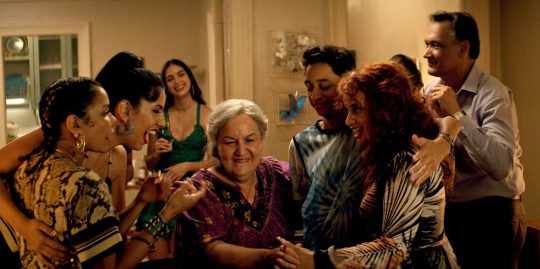
The love that Abuela Claudia has for her community is reciprocated in smaller moments throughout the film, such as the dinner party pictured above, or the gathering at her apartment during the blackout. The true magnitude of her impact on the community as a whole only comes to light after her death, however. Scores of her neighbors walk down the street holding candles, congregating outside of her apartment while singing “Alabanza” (In The Heights 1:30:30-1:32:35). It’s a powerful moment of recognition for the matriarch of their community.
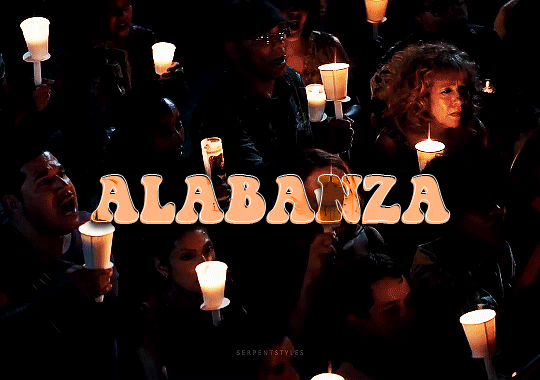
The day before Usnavi is set to leave for the Dominican Republic, he is surprised to discover that Abuela Claudia had been the lottery winner. In one final act of selfless love, she’d written “For Usnavi” across the top of the ticket. Like Abuela Claudia, Usnavi’s first thought is not what that money would do for him – but how it would help Sonny. He hires a lawyer to work on getting citizenship for Sonny and put the remaining money into a trust fund for Sonny’s future. Abuela Claudia’s legacy lives on in the hearts of the community as they perform their own acts of selflessness to care for the ones they love.
Gif & Image Sources: [x], [x], [x]
0 notes
Text
Nina: A Journey of Self-Discovery
youtube
Nina’s journey of self-discovery throughout the film is a complicated and difficult one. The song “Breathe” explores Nina’s feelings of guilt, loneliness, and uncertainty in who she is (In The Heights 20:02-24:04). She feels an immense sense of guilt in wanting to return home, fearing that she will be seen as a disappointment for being unable to thrive away from home. Simultaneously, she seems to feel like she doesn’t quite belong within her community anymore, as shown in the clip above:
As the radio plays old forgotten boleros,
I think of the days when this city was mine.
I remember the praise,
“Ay, te adoro, te quiero.” (Te adoro)
The neighborhood waved
And said, “Nina, be brave (Te quiero)
And you’re gonna be fine!” (Respira!)
And maybe it’s me, (Respira!)
But it all seems like lifetimes ago.
So what do I say to these faces that I used to know?
“Hey, I’m home?” (1:19-1:53)
Despite the love and support the community has always shown her, she feels as though no one will understand what she is going through. Her feelings of isolation and loneliness are reflected in Jorge Duany’s description of Transnationalism. In “Reconstructing Racial Identity: Ethnicity, Color, and Class among Dominicans in the United States and Puerto Rico”, he writes that “migrants have multiple identities that link them simultaneously to more than one nation. Transnationalism interacts with ethnicity, race, class, gender, and other variables, complicating the process of identity formation” (Duany 149). Nina’s identity is defined by her Puerto Rican roots as well as her upbringing in Washington Heights. Attending Stanford, however, has put all of the different aspects that make up her identity at war, leaving her feeling uncertain about who she is or where she belongs. In “Immigrants, Immigrant Neighborhoods, and Ethnic Identity: Historical Issues”, Kathleen Neils Conzen describes the way that moving away from one’s ethnic community can further complicate one’s relationship to their identity: “this could be taken as a sign that they had already begun to cast off some of their ethnic identity and as a signal that without the daily reinforcement of the communal culture they were inevitably committed to ultimate assimilation” (605). Unlike Vanessa and Usnavi, all Nina dreams of is returning home to the familiarity and safety of her community. Furthermore, she does not want to lose her connection to her Puerto Rican roots, nor to the place she calls home: Washington Heights.
Just after “Breathe”, Nina tells her father that being at Stanford feels like a betrayal “of my family. My community” (In The Heights 24:18-24:30). The real reason for her complicated feelings does not emerge until later in the film, when she reveals multiple racially motivated incidents that took place at Stanford. She describes being mistaken for a waitress at a diversity dinner hosted by the dean and being searched when her roommate’s pearl necklace went missing. The exclusion she endures makes her feel alienated and unwelcome in a place she thought would guide her toward a successful future. She has her heart set on returning to the community – until Sonny finds out that his undocumented status means that he will be unable to pursue higher education. He tells her that he always dreamed of being just like her, leaving Washington Heights to attend college. His situation inspires her to return to Stanford in the hopes of creating a way for undocumented immigrants to pursue a college education. Her privilege of being a citizen and being able to afford to attend school allows her to fight for the rights of the people she loves. Her return to Stanford no longer feels like a betrayal. Instead, it is a way of bettering the lives of not just her own community, but also other immigrant communities around the country that face the same exclusion in the pursuit of knowledge.
0 notes
Text
Dreaming of What $96,000 Could Do...
youtube
What would you do if you won the lottery? The residents of Washington Heights imagine the possibilities of that very question when they learn that Usanvi’s bodega has sold a winning ticket worth $96,000 (In The Heights 44:22-50:15). No two characters have the same dream: while Benny imagines attending business school, Daniela envisions moving to Atlantic City; Carla yearns for a new weave, while Vanessa dreams of moving downtown. Usnavi pictures using half the money to keep himself from financial ruin and giving the other half to Abuela Claudia. Sonny, meanwhile, dreams of using the money to help the community, including fixing housing, purchasing computers, providing accessible internet, supporting education, and protesting a corrupt system designed to fail the inhabitants of Washington Heights. In the clip above, Benny also details the privileges that more money would afford them:
For real, though,
Imagine how it’d feel goin’ real slow,
Down the highway of life with no regrets,
And no breakin’ your neck for respect
Or a paycheck. (1:26-1:37)
Right now, the residents of Washington Heights are working to survive. As Benny imagines it, $96,000 would mean being able to enjoy life without having to stress over whether they’ll be able to make ends meet. Even a slight change in class could result in not having to resort to any means necessary to make money. This story may be a celebration of the love and support that can be found within a community, but it also explores the limitations that race, class, and citizenship place upon people just trying to survive.
0 notes
Text
No Me Diga: The Gentrification of Washington Heights



Like Abuela Claudia’s home, Daniela’s Salon serves as a mainstay of the community. The salon ladies – as Usnavi calls them – Daniela, Carla, and Cuca, attend to the beauty needs of their community. Their clients don’t just come to get their hair, nails, and waxing done - they come in for the latest gossip, too! Rising rent in the area, however, means that Daniela is being forced to move the salon out of Washington Heights. Usnavi reveals that she has not been the first, and she likely will not be the last. According to Ramona Hernandez, Utku Sezgin, and Sarah Marrara in “When a Neighborhood Becomes a Revolving Door for Dominicans: Rising Housing Costs in Washington Heights/Inwood and the Declining Presences of Dominicans”, gentrification has become a serious issue in the area. They write: “Research has found that Washington Heights/Inwood is one of the most rapidly gentrifying neighborhoods in New York City” as the cost of rent “has appreciated six-fold between 2000 and 2015” (Hernandez, Sezgin, and Marrara 4). As the cost of rent continues to rise, more and more members of the community are forced out of their businesses, their livelihoods, and their communities. Relocating to another area does not guarantee that they will find that same sense of community as the one they have grown accustomed to in Washington Heights. Gentrification is not unique to this area alone; it is part of a larger problem that forces lower income people, oftentimes immigrants and people of color, out of the areas they call home.
Gif Source: [x]
2 notes
·
View notes
Text
Sonny & The Impossible Sueñito
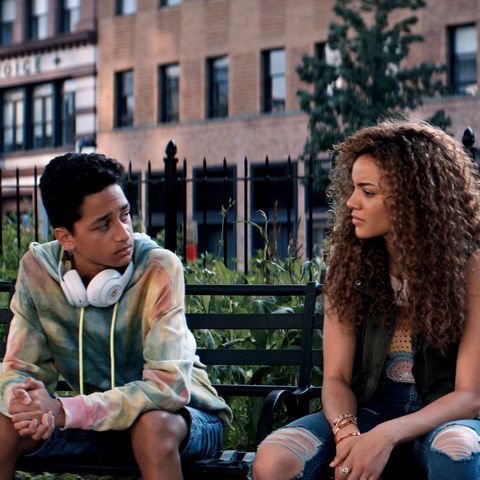
Sonny’s pursuit of his sueñito is hindered by an additional factor that the other characters in the film are privileged to have: citizenship. While Usnavi dreams of taking Sonny and Abuela Claudia with him to the Dominican Republic, Sonny dreams of attending college in the United States. During a protest he attends with Nina, he has a heartbreaking realization that this dream is not possible for him. Nina, not understanding what’s wrong, tries to reassure him that the speaker was referring to undocumented immigrants – only Sonny himself is an undocumented immigrant. He views Nina as a role model for leaving Washington Heights to pursue an education. Unlike Nina, however, his citizenship status acts as a limitation of what’s possible for him to achieve. In their article, “Immigrant Enclaves and Ethnic Communities in New York and Los Angeles”, John R. Logan, Wenquan Zhang, and Richard D. Alba discuss the possible ways that immigrants might view their communities: “For some, the ethnic neighborhood is a starting point; for others, it may be a favored destination” (300). For Usnavi and Vanessa, Washington Heights is their “starting point”; their dreams, at this point in the film, expand beyond the borders of their barrio. Meanwhile, Nina, at this moment, views her community as her desired destination. Sonny has dreamed of Washington Heights being his "starting point", but his citizenship status restricts that possibility. Without the winning lottery ticket that Abuela Claudia left for Usnavi, Sonny might not have had the opportunity or the means to apply for citizenship. The lawyer warns that the process could take years, and even then, citizenship is not guaranteed. Nothing is impossible – but the limitations of citizenship and class make it feel almost impossible for Sonny, and others just like him, to follow their dreams.
Image Source: [x]
0 notes
Text
Usnavi: The Art of Storytelling




The art of storytelling is such an important piece of keeping the culture of Washington Heights alive that the entire film is framed as a story told by Usnavi. The original storyteller in his life, Abuela Claudia, shares anecdotes of her own experiences to both honor where she came from and remind the community that they are not alone. Even the salon ladies’ penchant for gossip acts as a way to keep the community connected. Following the death of Abuela Claudia, Usnavi follows in her footsteps to become “the barrio chronicler–a role he built upon from his experiential knowledge that comes from a lifetime of living in Washington Heights–but perhaps more importantly, through the many conversations he has with his stable set of clients, neighbors, and friends as the local bodega owner” (Cázares 103). It is through conversation and storytelling that we create long-lasting bonds with one another and, in turn, create a stronger, more connected community. Usnavi doesn’t quite realize how connected to the community he is until he is about to leave. His decision to stay stems from the realization that this has been his home all along.
Usnavi does not just honor Abuela Claudia’s legacy through storytelling, however; he also assumes the role of caregiver for others in his community. Asking Daniela to cosign Vanessa’s lease and using the $96,000 lottery ticket to set Sonny up for a successful future are the selfless acts of love and support that keep the community alive and thriving. While storytelling serves as a way to honor and inspire, actions show how deeply connected the members of the community really are to one another. Furthermore, In The Heights itself is a love letter to Washington Heights and its community. As of 2017, “Miranda and Hudes stand in a unique position in that they have written the only successful Latinx play to be performed on Broadway, written by a Latinx about the Latinx experience, specifically with respect to gentrification. Opening to great reviews, the play would later go on to win the Tony Award for best musical in 2008” (Cázares 90). The success of this musical on Broadway, and the fact that it has been made into a movie, speak to the importance of telling stories that are representative of the population. The story may be a fictionalized snapshot of life in Washington Heights, but it speaks to the experience of many immigrants living across the United States – and worldwide. While everyone’s story is different, sharing with one another cultivates empathy, understanding, and the sense that we are never truly alone in life.
Gif Source: [x]
1 note
·
View note